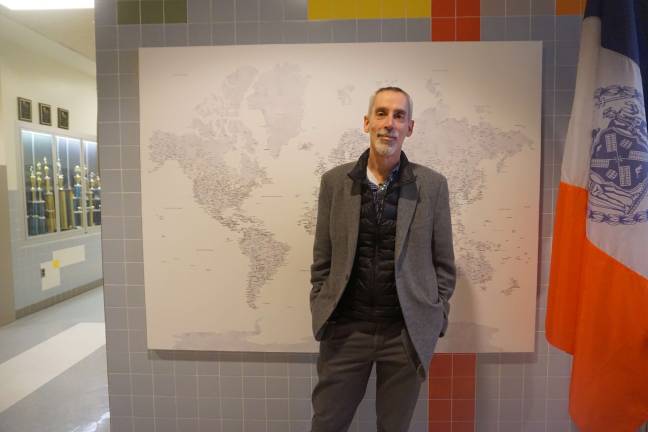Engaging education

Kids always end up in the principal’s office at East Side Middle School — but not because they’re in trouble. They’re assembling around the desk in Principal David Getz’ office during zero period before school has even begun for poetry club — or they’re having a meeting about the 59th Street bubble, working to get it back under public control.
Then homeroom rolls around and the student council group shows up. They’ve been working with Getz and City Council Member Ben Kallos to get legislation passed that would require all middle and high schools in the district to have gay-straight alliances.
“It’s always been a very involved, very engaged school,” explains Getz. “My kids are trying to make the Upper East Side a better place. We’re trying to make the city a better place.”
His days are jam-packed with teacher observations, lunch-period book clubs, meetings with parents, and unexpected student issues.
“My typical day? It’s interrupted every five minutes,” he jokes. “Things are always happening. It’s fun — it’s a lot of fun, but things are not always scheduled.”
But the many interruptions don’t stop Getz from doing what he does best: fostering a strong sense of community and respect throughout ESMS, which gives educators and students alike the ability to create a positive learning environment.
“What really permeates our school is trust, respect, compassion and concerning thoughtfulness,” he says. “We want to develop kids who are really rigorous thinkers, and empathy and emotional literacy is a big part of what we do here.”
Prior to his days as principal, Getz worked as an elementary school teacher and an author. Much of his writing was inspired by his early years as a teacher. When he wrote his novels, they were taken directly from his teaching journals. While composing his nonfiction books, he imagined his very own students as his target audience.
Since taking over the helm at ESMS, however, he hasn’t felt the same compulsion to write that he used to. “My job is very creative,” Getz said. “The creativity that I needed to find an outlet for through my writing — a lot of it happens here. The drive and the connection is similar. Part of my impulse to write is to communicate with people about things I find important. I’m doing that all the time, and it’s reciprocal. If you write for theater and create a play, people in the audience are being moved by your words onstage. That’s what you seek. I’m creating that in the morning when I come to work. ... It’s a real joy.”